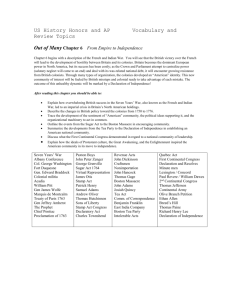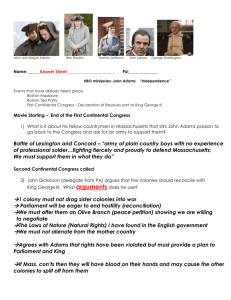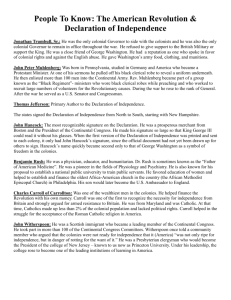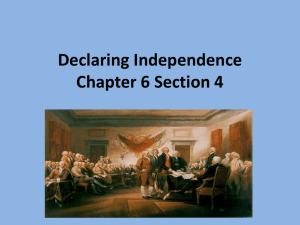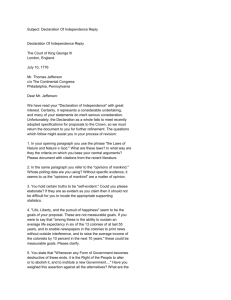The Crisis of Empire, 1763-1776 Early American Social History
advertisement
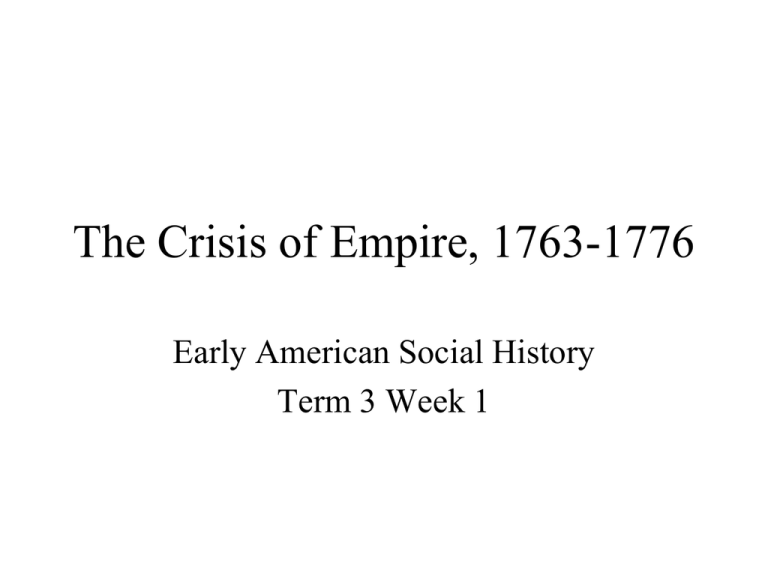
The Crisis of Empire, 1763-1776 Early American Social History Term 3 Week 1 Introduction • Problem of rapid change. GB seemingly at height of power in 1763, yet Declaration of Independence in 1776. • How and why does this happen so quickly? • Why are colonies and GB unable to get along? • Importance of events, but also mentality/ideology America in 1763 Problems in 1763 • War and aftermath brings problems: – debt – vast new territory to police • Solutions : – stationing regular army in colonies, – limiting white settlement so more defensible, – raising revenue through taxation in colonies. Americans? • Growing sense of difference from GB • Most Americans not born in GB by 1760s. • Significant proportion not ethnically British (French, German, African, Dutch). • Departure from GB because something ‘missing’ • Unique colonial events eg Gt Awakening fostered sense of common identity. • Life of average American very diff from life of average Englishman. Controlling the colonies • loose control since Gl Revn – cols start to function as independent political and cultural entities • • Colonies claim ‘rights of Englishmen’ secured in 1690 eg liberty, constitutional govt, rule of law etc • Cols saw themselves as EQUAL part of empire • Preconditions of independence in place? Taxation • Debt problem • All attempts to tax resisted, ‘no taxation without representation’ • Stamp Act 1765, revoked 1766 • Townshend Acts 1767 • No significant revenue stream to treasury ‘Funeral of Miss Ame. Stamp’ Protagonists • Revolution led by elite, merchants, lawyers, planters - ‘founding fathers’ • Revn as a conservative movement? • Needed popular support. George Washington, 1732-1799 Planter, Soldier, Politician. Member of both Continental Congresses, Commander of Continental Forces, President of the Constitutional Convention; First President of the United States, 1789-1797 Benjamin Franklin, 1706-1790 Philadelphia Printer, editor of Pennsylvania Gazette 1729-49; London representative of several colonies 1757-75; helped draft and signed Declaration of Independence; Ambassador to France 1778-83; wrote the Treaty of Paris 1783; signed the Constitution. Thomas Jefferson 1743-1826 Drafted and signed Declaration of Independence; 3rd President of the United States, 1801-1809. John Adams, 1735-1826 Member of both Continental Congress;signed Declaration of Independence; helped draft Treaty of Paris; Vice-President 1789-97; 2nd President of United States, 1797-1801 Samuel Adams, 1722-1803 Member of Sons of Liberty; created Committees of Correspondence, 1772; member of Continental Congress 1774; signed Declaration of Independence Ideology • Need to win “hearts and minds” • Stress on “virtue”, natural rights, heroic struggle vs oppression & slavery. • Importance of demagogues, eg James Otis and Samuel Adams • Propaganda war • Media Benjamin West, The Cricketeers (1763) L-R: James Allen, b. Philadelphia, 1742, studied law in London 1761-5, stayed in the US but remained a loyalist. Ralph Wormeley b.Virginina 1745, Eton 1751-62, Trinity Hall, Cam 1762, stayed in the US but remained a loyalist. Andrew Allen, b Philadelphia 1740, studied law in London 1761-5, joined British Army in 1776, lost all his property and moved to London Ralph Izard, bn South Carolina 1742, Hackney School then Trinity Hall, emissary of American govt in Paris 1776-9; served in Continental Congress from 1779 Arthur Middleton, bn South Carolina 1742, Hackney School then Trinity Hall; signed Declaration of Independence, served in Continental Congress, British POW in Florida by end of war. Thomas Paine • Pre-existing Role of Organised Violence Provocation W.D. Cooper. "Boston Tea Party." The History of North America. London: E. Newberry, 1789. Engraving. Plate opposite p. 58. ’The able doctor; or America swallowing the bitter draught’ London magazine, v. 43 (1774 May), p. 184. Slide to war • Lexington and Concord April 1775 Press Reports of Lexington Jefferson’s rough draft of the Declaration of Independence, with corrections by Benjamin Franklin and John Adams Printed final version of the Declaration of Independence Why the British lost (or why the Americans won!) • • • • Tactics France Logistics Mistakes Surrender of Cornwallis at Yorktown 1781 The United States of America, 1783

